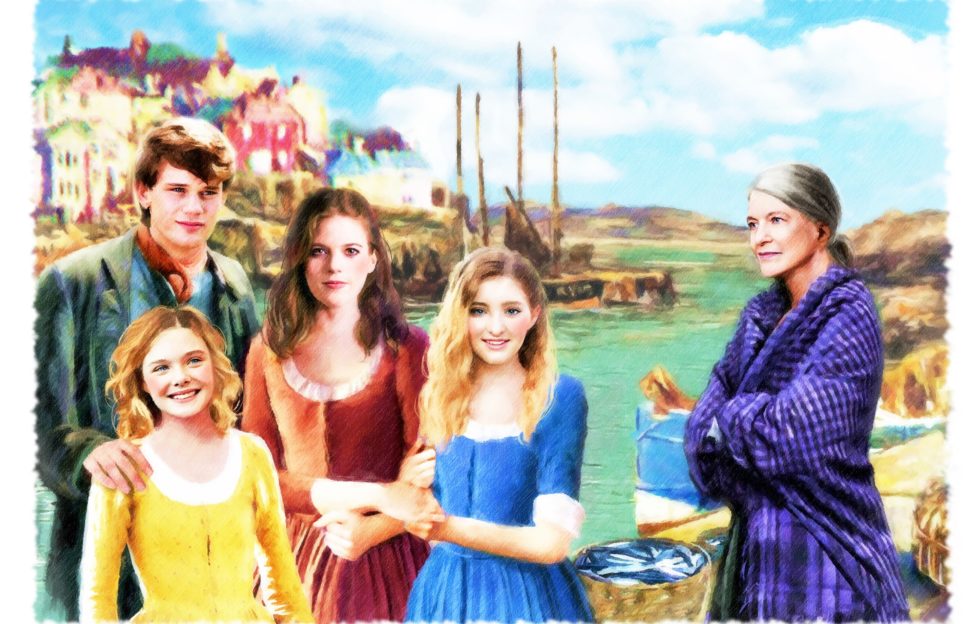Northern Lights – Episode 46

Northern Lights by Betty McInnes
« Previous Post- 43. Northern Lights – Episode 43
- 44. Northern Lights – Episode 44
- 45. Northern Lights – Episode 45
- 46. Northern Lights – Episode 46
- 47. Northern Lights – Episode 47
- 48. Northern Lights – Episode 48
- 49. Northern Lights – Episode 49
Aboard the Floating Light the Bell Rock workforce felt the full fury of the storm at sea. Alec Cargill and his workmates feared for their lives at times but survived, helped by false courage generated by more beer than was good for them.
Next day the wind abated and the seas calmed. The men assembled in sober mood to hear Robert Stevenson announce the Floating Light had broken free from the moorings that morning. Had it happened at the height of the storm the vessel would undoubtedly have foundered upon the rock.
Stevenson intended to move the Floating Light to a safer anchorage. Alec groaned. More than a mile to row to work now!
Even so, they were determined to stay till the onset of winter weather at the end of October made work on the rock too hazardous. The wooden beacon-house must be made ready by then as a refuge when work resumed in the spring of 1808.
Alec waited nervously for Maggie’s letter with her reaction to his delay. When the mail finally arrived he winced at the strength of Maggie’s annoyance.
Even more daunting was word of another lass in the household, already dominated by a surfeit of women.
Alec decided he’d occupy a berth ashore in the workyard barracks to finish his apprenticeship over the winter, before returning to work upon the rocky shoal where his father and crew had perished.
The place had a strange fascination for Alec. He dreamed of a lighthouse standing tall on the summit, rising out of dark depths from the sea bed. He could not rest till the dream became reality.
* * * *
The reclusive Marion Cameron had been spotted in Cameron’s Grocery store after years of inactivity, arousing much speculation.
Beatrice was disturbed by her mother’s behaviour. She was pondering the situation when she went out one morning to the store room in the close beside the shop to collect a fresh farmhouse cheese.
“Beatrice?”
She whirled, to see the man whose heart she had broken years ago. Jeremiah Cuthbert, the blacksmith.
“I told you to forget me.”
“As if I could.”
“I begged you to go and marry another.”
“As if I would!”
He came near. She felt the remembered warmth of his arms.
“Do you still love me, Beatrice?”
“Till the end o’ my days,” she admitted sadly. “Have ye come to taunt a sour spinster wi’ what might have been?”
The smith flushed.
“Of course not, dear. I respected the decision to care for your sick mother, but I always hoped for the poor lady’s recovery. She’s been seen in the store in better health, so I have come wi’ a proposition.
“Let us marry and bring your mother to live wi’ us in the smiddy seat. There’s plenty room there for her comfort and care.”
Beatrice broke down.
“I always knew ye were the kindest o’ men! God knows I long tae marry you, but my father’s will forbids it. If Mother leaves the store it will be sold to ensure her future care.”
She sobbed.
“If we take our chance o’ happiness Samuel loses his livelihood. How could we hae that on our conscience?”
He took her hands.
“We can contest the will.”
She shook her head and gazed up into his eyes.
“I’m destined to be a spinster left upon the grocery shelf, Jeremiah.”
“Never!”
He took her in his arms but she broke free.
“Please, my darling, accept it. There is no future for us. Let me go!”
Breaking free, Beatrice ran back into the shop.
The lovers had not noticed that Marion Cameron’s door stood ajar at the top of the stairs. She had heard every word.
The smith stood dejectedly in the close below. There were silver strands in the dark hair of this man who should have been her gude-son.
His expression was anguished. He squared his shoulders and strode off into the street without a backward glance.
Marion closed the upper door and stood looking round her world – a heavily screened window and worn armchair where she had sat since her husband’s death, watching customers enter and leave his store.
Then, one day, another widow had appeared in the street below.
Lilias Spink was tough as old boots, and getting on with life. Marion’s room, once so safe and sound, had suddenly seemed stifling.





